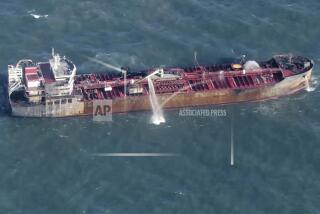Tanker Oil Dissipated, Officials Say : Spill: Most of the 3 million gallons lost off Galveston burned up or evaporated, according to the Coast Guard. Some tar balls may reach shore.
- Share via
GALVESTON — With the fire aboard the tanker Mega Borg under control, the U.S. Coast Guard Wednesday estimated that 3 million gallons of light African crude oil had spilled from the ship into the Gulf of Mexico during the last four days, but that most of it had already dissipated.
And as the captain of the crippled tanker was giving the first public account of what happened last Saturday when an explosion in the ship’s pump room started the inferno, state officials were calling for the use of microbes that “eat” oil.
Coast Guard Capt. Thomas Greene, the federal on-scene coordinator, said in a news conference that only about 12,000 to 40,000 gallons of oil remain in the water. He said the remainder was either incinerated as it fed the fires on board and in the water, or it had evaporated.
“We are not seeing a great accumulation of oil on the water,” he said.
Greene, in what has become a daily midday briefing, said only one of the tanks was leaking oil and the calculation of how much crude was missing was based on how much water--a heavier substance than oil--was in the bottom of the tank. He said also that, when the rising water reached the hole in the hull, both the flow of oil and the fire would stop.
The Coast Guard captain said that tar balls were expected to wash up on some Texas beaches because of oil spilled from the tanker, but he could not predict when or where that would be. On Tuesday, a consultant for the cleanup operation had predicted that no oil residue would reach the beaches.
Wednesday marked something of a transition in the drama of the Norwegian-owned tanker, as the focus of the attention moved from keeping the Mega Borg afloat to cleaning up the oil that had spilled from its tanks. Eight skimmers were working around the ship and two more from Great Britain were expected today. Firefighters, meanwhile, fought “hot spots” in the engine room, the only place left where there were still flames.
While the cleanup continued, the tanker’s captain, C. M. Mahidhara, told a Norwegian investigating board what happened on the night of the explosion.
Mahidhara, who is Indian, said oil was being transferred to a smaller tanker while the Mega Borg was anchored 57 miles off the Texas coast. He said he was in the ship’s radio room at about 11:30 p.m. Friday when he felt something odd.
“Suddenly, there was sort of a bump--I can’t say there was an explosion--a vibration,” he told the panel. The captain said the door of the radio room flew open, ceiling tiles fell, the passageway filled with smoke and the lights went out.
Mahidhara said he raced to his cabin, where he found his wife and children huddled, and screamed at them to get out. He took them on deck but couldn’t find a way down because of the flames shooting from the pump room.
“Flames were licking up right over the bridge,” he said.
The captain and his family found a way down to the poop deck, where most of the crewmen had assembled. They began evacuating to a work boat, while five remained behind to search for the crewmen who were missing on the forward deck.
Two men were found dead. Two others are missing and presumed dead.
When the Coast Guard arrived, Mahidhara said he was told it was not safe to remain on board his ship.
Mahidhara has been a seaman for 17 years and a ship’s master, or captain, for the last five.
Meanwhile, both the Texas land and water commissioners Wednesday urged the use of microbes to disperse the oil spill, which was 14 miles long and about five miles wide.
Certain types of microbes consume oil, then become part of the food chain, a process known as “bioremediation.” Land Commissioner Garry Mauro said extensive tests had shown the process to be effective and called on federal officials to allow the blanketing of the spill with the microbes, which would be dropped from a crop duster.
“It’s time to try bioremediation out in the real world,” Mauro said. The Coast Guard agreed, pending approval by the Environmental Protection Agency.
More to Read
Sign up for Essential California
The most important California stories and recommendations in your inbox every morning.
You may occasionally receive promotional content from the Los Angeles Times.









